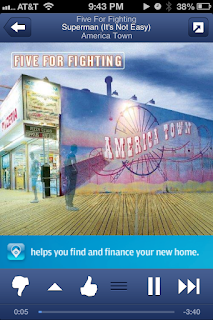Fast forward 25 years to today. We still have FM radio, and the DJ that pushes music that he believes his audience wants to hear. Listeners tolerate commercials every 3rd song, and everyone listens to the same thing at the same time if they choose to tune in. Does this meet the needs and preferences of every listener?
In the last 10 years, we have seen the advent of satellite radio that is now Sirius XM. It has taken the FM concept, but gone a step further to offer listeners different genres of music, talk radio and news radio to its audience. The product is a definite improvement from the FM model, but it is little more than a programmatic change.
Now comes Pandora. Looking at Pandora, the listener is the DJ. He can pick the artists that he wants to listen to, and Pandora programs all music based on the artist and other acts and music similar to the artist. The listener can personalize his station by giving his account feedback on each song. He can like the song so it will return more frequently and dislike a song to ensure that it never returns to his ears. Boy, how I wished I could have done that 25 years ago.
So if we can personalize the songs we listen to, how can we apply this concept to our educational setting?
Personalized Learning Stations.
Find ways to personalize learning. There is so much literature out there that supports differentiating learning that meets the unique needs of the learner. We must move from the DJ dependent radio station of education to providing a multitude of ways that students can extend their learning independent of the teacher. This change is a philosophical in nature that moves the focus from teacher to student.Learning Requires Feedback
Pandora is awesome because the listener is in control of what he likes and doesn't like. Learners must be in an environment where they are not subjected to learning situations that disengage. Teachers should provide opportunities for students to give feedback about the learning opportunities that are provided. If teachers know what activities the students like, there is a strong chance that the activity will come back to their learning station again.Pause Feature
Students need a pause button in the learning process. Interruptions occur when kids learn, but how often do we allow students to push pause? Students learn at different speeds, and having a pause button allows the learner to spend a little more time solidifying their own understanding before moving on to a new task or concept.Fast Forward
Students need to move on for different reasons. Either they have a deep understanding and can move on, or the song being played for them does not engage them in learning. In a controlled fashion, teachers can create opportunities for students to fast forward to a new or different activity that will better help the student learn.New Station
Students are very creative and need to create their own learning stations. Teachers can provide students avenues for them to explore. This is a great way for students to solidify their knowledge by applying it to new and uncharted waters. When students are provide the autonomy to make a new station for learning, engagement increases and meaningful learning occurs.My old FM station didn't have any of these features and not many of my classrooms did either. Don't get me wrong. I had some of the most outstanding educators ever, and they shaped me into the person I am today. The focus then was on teaching and today's focus has changed to learning. That means the teacher has to evolve from the disseminator of information to becoming more versatile in their approach, delivery and creation of personalized activities. They must meet many different learning styles. Teachers and administrators must change their focus from the instructor to the instructed because students benefit most in classrooms where the focus is on them. In the Pandora classroom choice abounds and engagement soars.
Students are getting exposed more and more everyday to a Pandora style of learning. In what ways is your school or classroom like Pandora?

